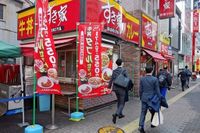Sukiya, the Japanese fast beef bowl restaurant chain, announced on its website on Saturday, March 29, 2025, that it will temporarily close nearly all of its branches across the country for four days. This decision, effective from Monday, March 31, 2025, comes in response to two alarming incidents where customers discovered a rat in a bowl of miso soup and a bug in another dish.
As the largest chain of beef bowl restaurants in Japan, Sukiya is owned by Zensho Holdings. The company had already faced backlash earlier in the year when, on February 22, 2025, a customer reported finding a rat in a bowl of miso soup at one of its branches in Yonago, located in western Japan. Following this incident, Zensho Holdings saw its stock price plummet by 7% on March 24, 2025.
In a statement released on Saturday, Sukiya confirmed that it experienced a second contamination incident on Friday, March 28, 2025, when flies were found in a product at a branch in the suburbs of Tokyo. The company emphasized the seriousness of these occurrences, stating, "We take the incident very seriously. We offer a sincere apology to our customers." This incident has raised significant concerns about food safety and hygiene practices at the popular chain.
As a precautionary measure, Sukiya decided to close all its branches in Japan, except for a few located in shopping centers, from the morning of March 31 until the morning of April 4, 2025. This temporary closure aims to implement measures to prevent further incidents involving pests and rodents.
According to Zensho's recent disclosures, Sukiya operated approximately 1,965 restaurants in Japan by the end of 2024, surpassing its competitors Yoshinoya, which has around 1,250 branches, and Matsuya, which operates about 1,100 locations. Additionally, Sukiya manages around 650 restaurants outside Japan, with establishments in regions such as China, Southeast Asia, and Latin America.
The incidents have not only affected customer trust but have also impacted the company's financial standing. The stock market reaction to the earlier incident reflects investor concerns about the brand's reputation and operational integrity. With the temporary closure, Sukiya aims to restore confidence among its customers and stakeholders.
Food safety has become a critical issue for many brands in the fast-food industry, particularly in Japan, where consumers are increasingly vigilant about hygiene standards. The recent events at Sukiya highlight the challenges that food service companies face in maintaining high standards of food safety.
In light of these incidents, industry experts suggest that Sukiya and similar companies must reassess their food safety protocols. This includes regular inspections, employee training on hygiene practices, and transparent communication with customers about safety measures being implemented.
As the temporary closure approaches, customers have expressed mixed feelings. Some are supportive of the company's decision to prioritize safety, while others are concerned about the implications for their favorite dining spots. Social media platforms have been buzzing with discussions about the incidents, with many sharing their own experiences at Sukiya.
In conclusion, Sukiya's decision to temporarily close its branches underscores the importance of food safety in the fast-food industry. As the company navigates this challenging period, it will be crucial for them to take significant steps to address the underlying issues and reassure their customers of their commitment to quality and safety.





